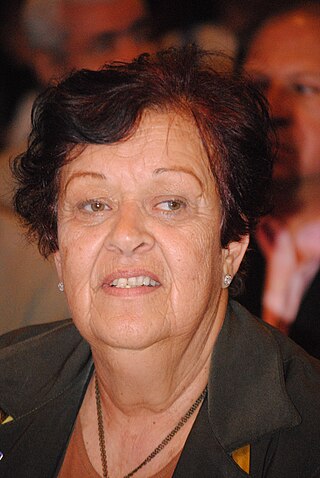Top Qs
Timeline
Chat
Perspective
Selma Baccar
Tunisian film director and politician From Wikipedia, the free encyclopedia
Remove ads
Selma Baccar or Salma Baccar (born December 15, 1945) is a Tunisian filmmaker, producer and politician. She is considered the first woman to make a featured length film in Tunis.[1][2] Baccar is known for creating manifestos through her films, centered around women's rights in Tunisia.[1]
Remove ads
Early life
Selma Baccar was born on December 15, 1945, in Tunis. Her family moved to Hammam-Lif when she was seven year old.[1] Baccar was raised as a Muslim by her parents and has done the pilgrimage to Mecca with her family twice; however, Baccar identifies as agnostic.[1] She began to study psychology in 1966 to 1968 in Lausanne, Switzerland. She relocated after 2 years to study film in Paris at Institut Français de Cinéma.[3] She then became a member of the Tunisian Federation of Amateur Filmmakers (Fédération Tunisienne des Cinéastes Amateurs, FTCA), where she worked as an assistant director for a Tunisian television series.[1][3]
Remove ads
Career
Summarize
Perspective
At the age of 21, Baccar began to create short films in 1966, along with other women at the Hammam-Lif amateur film club.[1] Her films revolve around women's issues and rights in Tunisia. Her first short film, made in 1966, was a black and white film called L'Eveil, that tackled women's liberation in Tunisia. L'Eveil later received accolades. Baccar directed her first full-length feature film in 1975 titled Fatma 75, viewed as a "pioneer film" in Tunisia.[4] This was the first full-length feature film directed by a woman and characterised as "a feminist essay film about women's roles in Tunisia."[5] The film uses a didactic style film that addresses feminism in Tunisia[1] and was banned for several years, due to censorship issues in multiple scenes, by the Tunisian Ministry of information, and could not be viewed in commercial movie theatres.[3]
Her second full length film, Habiba M’sika (1994), was a biopic of a famous Tunisian singer and dancer, Marguerite Habiba Msika.[3] Flowers of Oblivion told the story of Zakia, an opium addict in a psychiatric hospital in Vichy-ruled Tunisia in the 1940s.[2] The director owns her own production company under Intermedia Productions alongside other notable female directors, to make films and commercials.[3] Baccar also has produced a number of short films.[6]
Baccar's activism for Tunisian women's rights led her to an active political career and she became a member of the Al Massar political party.[7] In October 2011, Baccar was elected a member to the Constituent Assembly[8] In 2014, she was promoted from vice-president to president of the parliamentary group of Democrats in Tunisia, "the first and only woman to chair a parliamentary bloc."[7]
Remove ads
Filmography
Feature films
- 1976: Fatma 75
- 1994: Habiba M’sika/La Danse du feu/The Dance of Fire
- 2006: Knochkhach/La Fleur de l'oubli/The Flower of Oblivion
- 2017: El Jaida[9]
Other Films
- 1966: L'Eveil (Director, short film)
- 1985: De la toison au fil d'or/The Golden Fleece (director, short film)
- 1989: Moon Child (Producer, short film)[9]
- 2010: Baydha (Tabou) (Producer)
- 2016: Peluche (Producer)
Television series
- 1996: Le Secret des métiers
- 1997: Femmes dans notre mémoire
- 2002: Farhat Lamor (Joie d'une vie)
- 2005: Chara Al Hobb
- 2006: Nwassi w Ateb
- 2006: Assrar âailya
- 2007: Chaâbane fi Ramadhane
- 2007: Kamanjet Sallema
- 2007: Layali el bidh
Awards
- 1968 - L'Eveil (1966) received an award at the Festival International du Film Amateur de Kélibia and Sfax International Mediterranean Film Festival.[3][10]
- 1979 - Fatma 75 (1976) won the Gold medal at the International Filmfestival Mannheim-Heidelberg.[3]
- 1990 - El niño de la luna (1989) was nominated at the Goya Awards for Best Production Manager Award (Mejor Dirección de Producción).[11]
Honours
- 2014 : Knight of the National Order of Merit of Tunisia
- 2015 : Officer of the Order of the Republic of Tunisia
References
Wikiwand - on
Seamless Wikipedia browsing. On steroids.
Remove ads

